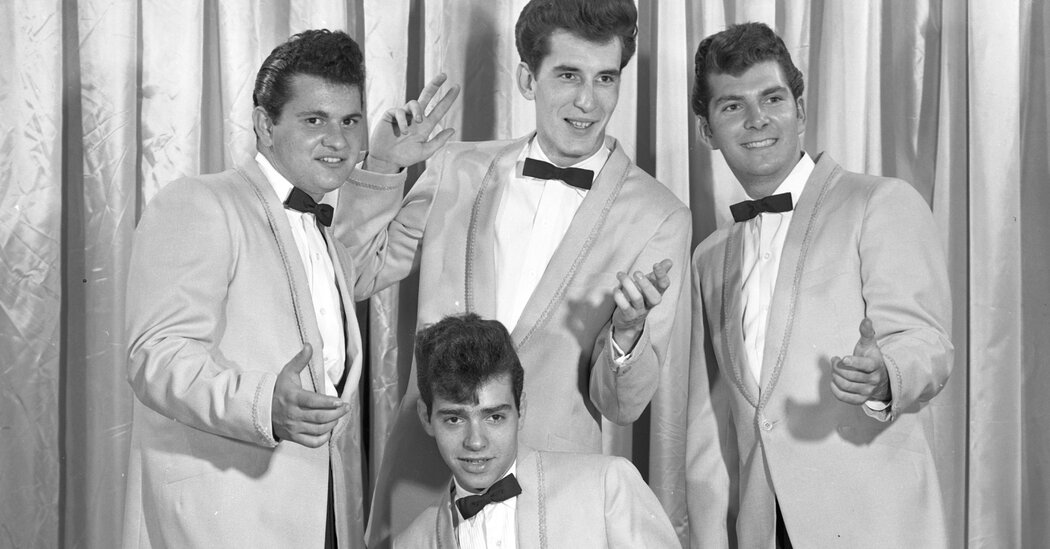
Larry Chance, whose Bronx vocal group the Earls was one of the most enduring acts of the doo-wop era, helping to keep alive the vocal harmonies, rhythmic syllables and onomatopoeic lyrics that had once been improvised on city street corners and in subway stations, died on Sept. 6 in a hospital in Orlando, Fla. He was 82.
His daughter, Nicole Chance, said the cause was complications of lung cancer.
Larry Chance and the Earls were distinguished as much for their longevity — the group began in 1957 as the High Hatters, and Mr. Chance was still performing in its latest incarnation this year — as for their hits, some of which became doo-wop anthems.
The first doo-wop groups were Black, but there were white artists in the mix almost from the beginning. The Earls were among the first.
“The Earls unknowingly became the forerunners of white doo-wop groups who took standards done by rhythm and blues balladeers and brought them to the attention of a new generation,” the music historian Jay Warner wrote in “American Singing Groups: A History From 1940 to Today” (1992).
Among the group’s most popular records were “Life Is But A Dream,” (1961), a song first recorded by the Harptones, a Black doo-wop group, in 1955; “Never” (1963), an up-tempo torch song; and, most notably, “Remember Then” (1962), which, with its distinctive chant of “Re-mem-mem, re-mem-ma-mem-ber,” reached No. 24 on the Billboard Hot 100 singles chart and became a staple of oldies radio.
“Life Is But a Dream” was a hit on New York radio and prompted invitations for the group to appear with the disc jockey Murray the K at the Fox Theater in Brooklyn and on Dick Clark’s popular television show “American Bandstand.”
The Earls’ signature song later became the ballad “I Believe,” whose inspiriting lyrics begin, “I believe for every drop of rain that falls, a flower grows/I believe that somewhere in the darkest night, a candle glows.”
The Earls’ 1965 recording of “I Believe” was far from the first; it had earlier been recorded by, among others, Mahalia Jackson, Elvis Presley and Frankie Laine, who had a hit with it in 1952. But it became a regular crowd-pleasing finale at the Earls’ live shows. The group dedicated its recording to Larry Palumbo, an early member who died in 1959 in an accident when he was in the Army.
“I Believe” was an illustration of the music executive Hy Weiss’s faith in the group: Their demo version was released as the completed master.
Mr. Weiss, who had offered the group a contract with his imprint Old Town Records shortly after hearing “Remember Then,” also figured in the transformation of Lawrence Figueiredo into Larry Chance. It happened just before “I Believe” was released.
“Hy Weiss wanted him to step out front,” Mr. Warner wrote, “and though Figueiredo was reluctant, Weiss and his super salesmanship convinced him to take a chance when he said, ‘I’m gonna call you Larry Chance.’”
The drummer Bobby Tribuzio, in a phone interview, characterized Mr. Chance, with whom he performed for six decades, as “a singer’s singer.” He was also a versatile entertainer (his solo shows incorporated comedy) and wrote songs, including “Get On Up and Dance (The Continental),” which he wrote with Jimmy Fracassi and the Earls recorded in 1976.
When doo-wop’s popularity declined in the early 1970s, the group adapted by briefly becoming a nine-piece rhythm-and-blues ensemble called Smokestack. They resumed performing as the Earls during the subsequent doo-wop revival.
In the 1980s, Mr. Chance also voiced the provocative radio characters Geraldo Santana Banana and Rainbow Johnson on Don Imus’s WNBC radio show.
His last public performance was in June at Archbishop Stepinac High School in White Plains, N.Y., where he sang “Stand by Me” as a duet with the singer, songwriter and music historian Billy Vera. Mr. Chance’s last recording was a duet of the same song with Mr. Vera in 2022.
Lawrence Figueiredo was born on Oct. 19, 1940, in the Bronx and raised in South Philadelphia — a neighborhood that also spawned the opera singer Mario Lanza, as well as Larry’s pop-music contemporaries Fabian, Frankie Avalon and Chubby Checker.
His father, John, owned a construction company. His mother, Mary (Pedra) Figueiredo, was a homemaker.
At the age of 6, Larry was cast in an elementary school production of “The Baker and the Pie Man.”
“I was the baker,” Mr. Chance told Gene DiNapoli, an entertainer and podcast host, in 2020. “I got applause. I decided then that’s what I wanted to do with my life.”
The family moved back to the Bronx in 1955. Mr. Chance later took some jobs with masonry companies to get by, but he pursued a singing career despite opposition at home.
When he told his father he wanted a career in music, Mr. Chance recalled, “he told me, ‘Get a man’s job.’”
In 1957, at around the time he graduated from Evander Childs High School in the Bronx, he and four friends — Bob Del Din, Eddie Harder, John Wray and Mr. Palumbo — formed the High Hatters.
They performed at local venues and were singing outside the entrance to a subway station when they were discovered by Johnny Powers, who recorded their version of “Life Is But a Dream” for his small Rome Records label.
Mr. Chance lived for decades in Sullivan County, N.Y., close to the Catskills, where he performed in hotels. He later relocated to Florida to be near his daughter.
In addition to her, he is survived by his wife, Sandra; a son, Christopher; and three grandchildren.
As the lead singer of one of the most durable doo-wop groups, Mr. Chance understood from the beginning that talent and luck weren’t enough. “Remember Then” was played on the radio for the first time in 1962 on a program whose listeners were invited to phone in and vote for the best of five songs.
“We had every kid in the North Bronx with a pocket full of dimes, and we just flooded that station with calls and won the contest,” he told Anthony P. Musso, the author of “Setting the Record Straight: The Music and Careers of Recording Artists from the 1950s and Early 1960s … in Their Own Words” (2007).
He acknowledged, though, that luck might have played a role when the group was deciding on a new name. They couldn’t afford to purchase the tuxedos, canes, spats, toppers and other formal attire they fancied to redeem their original billing as the High Hatters, and they couldn’t agree on what to call themselves.
“To make it fair, we stuck our finger in a dictionary and said whatever it falls on, that’s what we’ll be,” Mr. Chance told Mr. Musso. “I always said I was happy that I didn’t put my fingers about a quarter of an inch up, or we would have been called the Ears.”
Jeff Roth contributed research.













